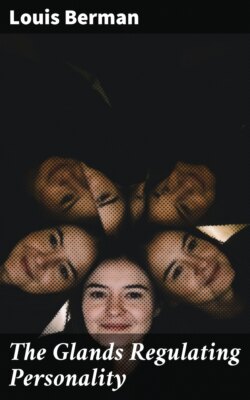Читать книгу The Glands Regulating Personality - Louis Berman - Страница 16
На сайте Литреса книга снята с продажи.
NEW PSYCHOLOGY
ОглавлениеThere are the claims and outcries and promises of the psychologists—the specialists in the probing of the human soul and human nature. In our time, the demand for a dynamic psychology of process and becoming, psychology with an energy in it, has split them into two schools—the emphasizers of instinct and the subconscious, the McDougallians, and the pleaders for sex and the unconscious, the Freudians. A synthesis between these two groups is latent, since their differences are those of horizon merely. For the McDougallians look upon the world with two eyes and see it whole and broad—the Freudians see through their telescope a circular field and exclaim that they behold the universe. It is true that they own a telescope.
But what has either to offer our quest for light on the future of the species? Nothing very much. Thus, to turn to the disciples of McDougall. In a recent volume entitled, "Human Nature and its Remaking," Professor William Ernest Hocking of Harvard contends that Man, all axioms about his nature to the contrary, is but a creature of habit, and so the most plastic of living things, since habit is self-controlled and self-determined. By the self-determination of the habits of the race will the new freedom be reborn. It sounds old, very old. And pathetic because it recognizes original and permanent ingredients of our composition in the words pugnacity, greed, sex, fear, as elements to be accepted in any system of the principles of civilization. It is the bubble of education all over again. What in our cells is pugnacity? What in our bones is greed? What in our blood is sex? What in our nerves is fear? Until these inquiries are respected, conscious character building or even stock breeding must remain the laughing stock of the smoking rooms and the regimental barracks.
Come the Freudians. To them we owe the aeroplanes to a new universe. They have opened up for us the geology of the soul. Layer upon layer, cross-section upon cross-section have been piled before us. And what a melodramatic cinema of thrills and shivers, villains and heroes, heroines and adventuresses have they not unfolded. Each motive, as the stiff psychologist of the nineteenth century, with his plaster-of-Paris categories and pigeon holes and classifications, labelled the teeming creatures of the mind, becomes anon a strutting actor upon a multitudinous stage, and an audience in a crowded playhouse. Scenes are enacted the febrile fancy of a Poe or a de Maupassant never could have conjured. The complex, the neurosis, the compulsion, the obsession, the slip of speech, the trick of manner, the devotion of a life-time, the culture of a nation all furnish bits for the Freudian mosaic. Attractions and inhibitions, repulsions and suppressions are held up as the ultimate pulling and pushing forces of human nature.
But is the problem solved? Is not human nature primarily animal nature? And do we so thoroughly understand this animal nature? Does not all this material of Freudianism consist of variations upon social burdens imposed on the original human nature? To be sure, at every moment of life, choices have to be made, and choice involves the clashing of instincts and motives, with victory for one or some, and defeat for the others. But the Freudian material per se—the sex material—is it not merely the by-product of a certain state of society? A sane society would eliminate nearly all of Freudian disease, but still have original human nature upon its hands. Why is it that of two individuals exposed to the same situation, one will develop a complex, the other will remain immune? The only soil we know of, the real foundation stones of our being and living, are the cells we are made of. Tell me the cellular basis of a complex, and I will grant that you have arrived at some real knowledge.
